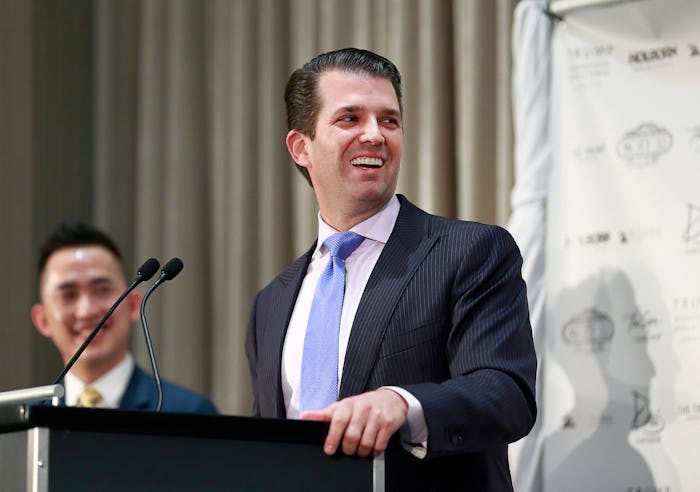News

Donald Trump Jr's Emails Might Hurt Him
After news recently came to light about a meeting between Donald Trump Jr. and a Russian lawyer to allegedly gain compromising information about then-Democratic presidential candidate Hillary Clinton, the president's son has been facing major backlash over claims that he may have been involved in collusion with Russia prior to the 2016 presidential election. On Tuesday, Trump Jr. took to Twitter to share the email communication from entertainment publicist Rob Goldstone, who was setting up a meeting between Trump Jr. and Russian lawyer Natalia Veselnitskaya. He explained he chose to make the correspondence public "in order to be totally transparent," but do Donald Trump Jr.'s emails prove he broke the law? (A rep for Trump Jr. did not immediately respond to Romper's request for comment.)
According to The New York Times, Donald Trump Jr. was first contacted about Clinton by Goldstone back in June 2016, when a former Russian business partner of the president's told Goldstone that he had been contacted by a senior Russian government official who could provide documents that “would incriminate Hillary and her dealings with Russia" and that it "would be very useful to [Donald Trump]." In a written statement he posted on Twitter, Trump Jr. shared the email, and claimed that when he received it, he thought the information about Clinton "was Political Opposition Research."
Trump Jr. said that when a planned phone call with Veselnitskaya didn't end up taking place, he agreed to meet with her in person in New York. But he defended the meeting as being meaningless, claiming that "she had no information to provide," and that it was "inane nonsense."
Regardless of whether or not Trump Jr. felt the meeting was a bust, and regardless of whether or not he actually did learn any compromising information about Clinton, the emails themselves certainly appear pretty damning. After all, the original email between Goldstone and Trump Jr. specifically indicates that the entire point of the meeting was to present information that would "incriminate Hillary." Most significantly though is that Goldstone even wrote that the "high-level and sensitive information ... is part of Russia and its government's support for Mr. Trump." Trump Jr.'s response, according to his email? "[If] it's what you say, I love it, especially later in the summer. Could we do a call first thing next week when I am back?"
That seems shady at best, but was Trump Jr.'s meeting with Veselnitskaya illegal? The answer isn't entirely straightforward, but lawyer Jeffrey Jacobovitz, who formerly represented White House officials during the Clinton administration, told The Washington Post he thinks the emails make a pretty solid argument that Trump Jr. "[conspired] with a foreign adversary to influence or undermine an election," which is most definitely a crime. Jacobovitz explained,
If [Trump Jr.] received an email in advance saying 'This is coming from the Russian government,' he's certainly knowledgeable about where the information is coming from. And he attempts to attend a meeting with the hope and intent to obtain inside dirt on Hillary Clinton. That would go a long way in trying to determine whether it's conspiracy. … It's not as if he walks into the meeting and he's surprised by what he's hearing.
George Washington University law professor Randall D. Eliason seems to agree. In a piece for The Independent, Eliason wrote that Trump Jr.'s decision to meet with Veselnitskaya appeared to suggest conspiracy, regardless of what may or may not have happened at the meeting itself, primarily because he seemed to be aware of the intention behind the meeting, and agreed to it anyway. Eliason said,
This meeting provides critical evidence about the state of mind of Trump representatives: They were willing to hear what a Russian individual had to offer about their opponent.
The first line of defence against a conspiracy allegation typically would be: 'That's ridiculous — I'd never agree to meet with someone from Russia under those circumstances. That line of defense appears to be gone. Members of the Trump campaign didn't call the FBI to report a Russian national's offer to dish dirt about the former US Secretary of State — they took the meeting.
So what happens next now that the emails are out in the open? It's not exactly clear. And given that the emails actually present so many further potential implications beyond Trump Jr. specifically — Jared Kushner, a senior White House advisor, was also at the meeting, for example, and then there's the overall question of what this could mean for the president himself — it's likely that the next steps will be complicated.
But while Trump Jr. may at least be claiming that the meeting was insignificant, it seems like that may not be true at all. And if so, there could be serious consequences ahead.